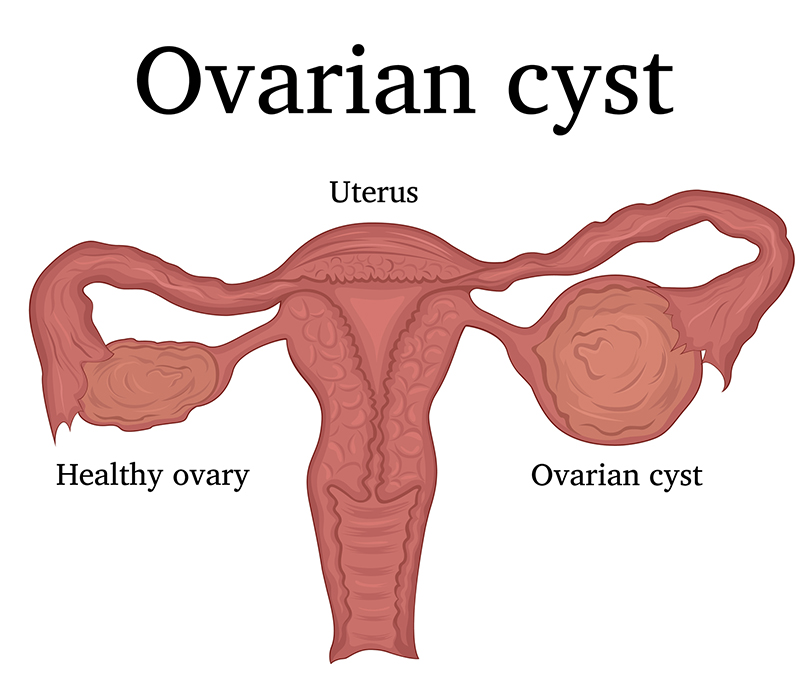
What are ovarian cysts?
Ovarian cysts are little sacs of fluid that form on or in a woman’s ovary. Each woman has two ovaries, one on each side of her belly. In women who are still having their monthly period, the ovaries release an egg about once a month.
Ovarian cysts can cause pain or a feeling of pressure in the belly, although some women might not feel them at all. Many women worry about cancer when they learn they have cysts, but, most of the time, cysts are not cancer.
What are the symptoms of ovarian cysts?
Many women have no symptoms. When symptoms do happen, they can include pain or pressure in the lower belly on one side. The pain can be dull or sharp, and it can come and go.
Sometimes, an ovarian cyst breaks open or causes the ovary to twist. This can be a serious problem. Call your doctor right away or go to the emergency room if you feel intense pain in the lower belly on either side that doesn’t go away. For example, you should go to the emergency room if you have sudden pain that makes you double over or makes it hard for you to walk and the pain doesn’t go away. Along with the pain, you might also feel nauseated or throw up or have light bleeding from your vagina.
What causes ovarian cysts?
There are many possible causes of ovarian cysts. The most common causes include:
- Ovulation or pregnancy – Ovulation is when an egg is released from the ovary each month. For this to happen, the ovary grows a sac, called a “follicle.” Sometimes, a follicle grows but does not release an egg and instead forms a cyst. Or, if a woman gets pregnant after the egg is released, a cyst can stay on the ovary for weeks or months. These kinds of cysts are not harmful and usually go away on their own.
- Dermoid cysts – These are a common type of cyst. They sometimes have teeth, hair, or fat in them. That might sound strange. Dermoid cysts are normally not harmful to your health, but your doctor might want to remove them with surgery.
- Polycystic ovary syndrome (also called PCOS) – In women with this condition, the ovary grows many small cysts instead of one big follicle that goes away each month. These cysts usually do not go away, but the cysts themselves do not need to be treated or removed. PCOS does sometimes require treatment for reasons unrelated to the cysts.
- Endometriosis – Endometriosis is a condition where tissue normally found in a woman’s uterus grows outside of the uterus. Endometriosis can also form cysts on the ovary. Women with endometriosis might have belly pain during their periods or at other times, pain in the belly during sex, or trouble getting pregnant.
- Cancer – Cancer is the cause of ovarian cysts in fewer than one in 100 cases. Ovarian cancer is most likely to affect older women who have been through menopause (no longer have a monthly period) or who have a family history of ovarian cancer.
How big is an ovarian cyst?
Cysts are usually 1 to 2 inches wide, but they can be bigger.
Is there a test for ovarian cysts?
Yes. Common tests include:
- Imaging tests – The most common kind is a pelvic ultrasound. This test uses soundwaves to make a picture of your uterus and ovaries. The pictures can show if you have cysts. It can also show where they are and how big they are. Your doctor might also take pictures with an MRI or a CT scan.
- Blood tests to check for pregnancy or the possibility of cancer
How are ovarian cysts treated?
That depends on what is causing your cysts and what your symptoms are. Possible treatments include:
- Waiting – Your doctor might want to do an ultrasound every couple of months. Your cysts might stay the same size, get smaller, or even go away. In those cases, you usually don’t need to do anything to treat them.
- Birth control pills – This medicine can stop some types of new cysts from growing.
- Surgery to remove a cyst or the whole ovary
What if I want to get pregnant?
That depends on what is causing your ovarian cysts. Most women with cysts are able to get pregnant. Even if an ovary is removed, women with just one ovary can usually get pregnant. If you can’t get pregnant, medicines or new technologies can help. Talk to your doctor if you want to have a baby.
This topic retrieved from UpToDate on: Nov 21, 2018.

